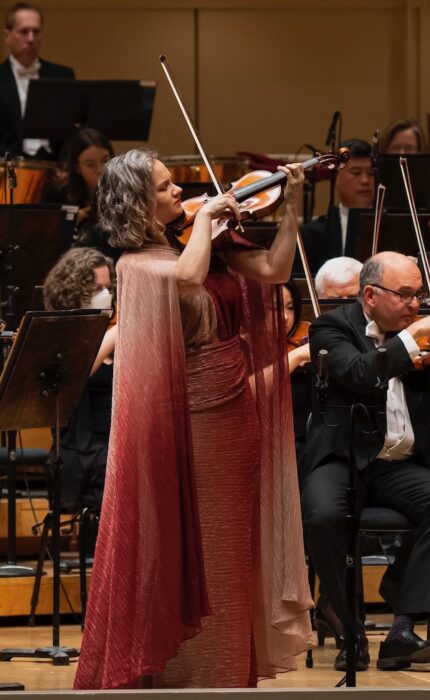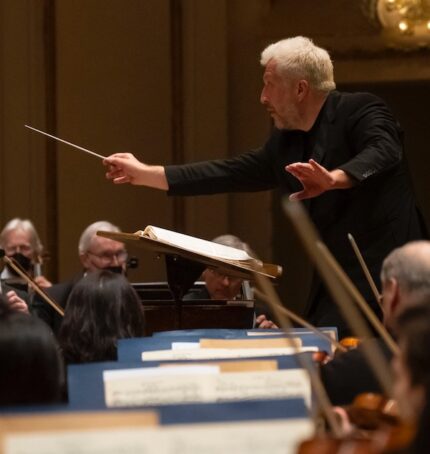A final score from a Finnish master with Hahn, Adès and CSO

After she played Einojuhani Rautavaara’s Violin Concerto (1977) in 2014, Hilary Hahn hoped that the Finnish composer might write a second concerto specifically for her. She conveyed her idea through conductor Mikko Franck, a frequent Hahn collaborator and a friend of the composer. Yet Rautavaara’s declining health appeared to make such a substantial project unlikely.
After Rautavaara’s death, however, a nearly completed manuscript of a pair of serenades for violin and orchestra—Deux Sérénades—surfaced among his papers, bearing hallmarks that made clear it was the work Hahn had suggested through Franck. (The violinist recounts the remarkable details of this story here.) Rautavaara’s student Kalevi Aho completed the score, which mostly entailed fleshing out the orchestration of the second movement, and Hahn premiered the finished work in Paris under Franck in 2019.
Hahn introduced Rautavaara’s final opus to the United States on Thursday night with the Chicago Symphony Orchestra. Franck was initially scheduled to lead these performances as well, but was sidelined by a lingering knee injury. Thomas Adès, who made his CSO podium debut last week, extended his stay with the orchestra to take on this program, including the Rautavaara premiere.
The first of the Deux Sérénades is entitled “Sérénade pour mon amour,” but this is an ambiguous and shifting portrayal of love. A wandering impression prevails, particularly in the meandering accompaniment that supports yearning lines in the solo violin. In the second, “Sérénade pour la vie,” the solo violin swirls in arabesques above a gently pulsating orchestral support, before a brief coda at a faster tempo brings the work to a close.
Perhaps inevitably, a reflective atmosphere suffuses these fifteen minutes, the last music Rautavaara wrote. Hahn brought her trademark poise and musical intelligence to the solo part, spinning the solo lines with graceful lyricism. Adès led a flexible accompaniment, highlighting orchestral details in a manner particularly impressive given the short time he had with the score.
An operatic second half followed. Hahn returned for Sarasate’s extroverted Fantasy on Bizet’s Carmen for Violin and Orchestra, effortlessly shifting from Rautavaara’s meditative mood to the Spanish virtuoso’s showoff aesthetic. She projected the operatic character’s seductiveness—particularly in the “Habanera” variations—while making short work of Sarasate’s technical pyrotechnics, including audaciously clean harmonics throughout.

Hahn answered the audience’s vigorous appreciation with an encore that was also a world premiere: Steven Banks’ Through My Mother’s Eyes, commissioned by the Chicago Symphony Orchestra Association and written for Hahn as part of her residency. The short movement clearly takes inspiration from Bach’s solo violin works, with arpeggiated figuration dancing above a harmonic ground bass, before closing with a private lullaby the composer’s mother sang to him as a child. Hahn gave the same stellar advocacy to this miniature as she did to the preceding works.
The evening closed with Adès leading the Suite from Richard Strauss’s Der Rosenkavalier in a vigorous, headlong rendition that must have set a new land record for the memorable medley. This forward-leading approach was well suited to the musical sex scene that opens both the opera and the suite, as well as other boisterous passages.
Yet the Presentation of the Rose and the luminous final trio both felt harried. There was energy to spare in this reading, but some of Strauss’s music simply calls for more spaciousness than Adès allowed Thursday night. Nonetheless, there was fine solo playing from William Welter, Robert Chen, and Esteban Batallán, and Adès drew a coquettish Viennese lilt from the orchestra in the Suite’s waltzes.
The evening opened with Sibelius’ Night Ride and Sunrise, Op. 55, a substitute for the originally scheduled Don Juan. The 1907 tone poem opens with an extended skittering gallop, over which mournful wind lines gradually begin to sound. This gives way to a gleaming horn chorale and expansive dawn depiction. Adès was emphatic and demonstrative here, but never hectoring or fussy, drawing out the nuance and color in Sibelius’ rich canvas.
The program will be repeated 1:30 p.m. Friday and 8 p.m. Saturday. cso.org
Posted in Performances





Posted Apr 15, 2023 at 7:29 am by Peter V Simek
Most magnificent performance ever.